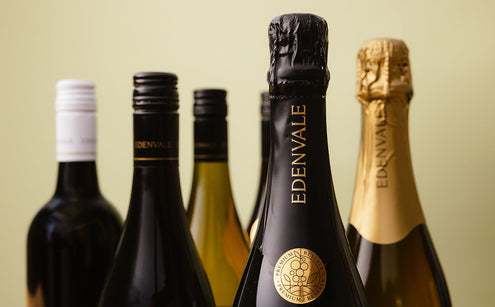The non-alcoholic wine scene is flourishing. According to market intelligence company Fact.MR, the non-alcoholic wine market is expected to reach $10 billion by 2027. You’re not the only person who is getting on board the non-alcoholic alternative movement!
With demand on the rise, a question that sometimes circulates is, “Why is non-alcoholic wine so expensive?”
In the case of Edenvale, we question the word ‘expensive,’ as our wines offer outstanding value for money. However, alcohol-removed wine is often priced similarly to regular wine. Why is that? Here, we look closely into the reasons so you can be reassured that an Edenvale purchase is worth every cent.
How Is the Price of an Alcoholic Wine Determined?
The production of traditional, alcoholic wines is a complex system that involves a large amount of land, labour, machinery and time. Depending on the size of the business and the winemaking process, the price can vary greatly. Research by the Department of Agricultural, Food, and Forestry Systems at the University of Florence examined the costs of making wine. The research study analysed each phase of winemaking:
- Production
- Processing I (from the grape to the fermented wine)
- Processing II (from the fermented wine to the aged wine)
- Bottling and aging wine in the bottle, and lastly;
- Marketing.
These production factors included:
- Family labour
- Non-family labour
- General costs (rents, administration, energy, etc.)
- Depreciation (for buildings, agricultural machinery, cars, etc.)
- Variable costs (pest management, fertilisers, vineyard equipment and tools, etc.)
- Land opportunity costs.
But how does this relate to the price of non-alcoholic wine? It’s perhaps no surprise that all the same processes and procedures apply (and then some!), as we discover below.

Extra Production Steps Affect the Non-Alcoholic Wine Price
Production costs remain the same, if not higher, for alcohol-removed wine, which uses the same initial wine-making production process. However, the method involves one additional element: alcohol removal.
And at Edenvale, we’ve taken that process to a whole new level. How? We recently invested $5 million in a brand-new, state-of-the-art wine-removal facility that is more efficient, sustainable, and faster than previous technology. Indeed, this is where age-old craftsmanship meets tomorrow’s tech, and the two work together to produce outstanding wines. Learn more about how we remove alcohol from wine.
Creating non-alcoholic wine is more complex than producing regular wine. Equipment, technology, time, and labour all contribute to production costs being more than those of traditional alcoholic wine.

Non-Alcoholic Wine Prices Aren’t Determined By Alcohol
Alcohol itself doesn’t make wine expensive.
Ok, that sounds odd at first, but hear us out. It’s not so much the alcohol in a drink that influences the cost. It’s the other ingredients, processes, winemaker, transporting, marketing and much more.
Both non-alcoholic and alcoholic wines include similar ingredients and undergo the same processes. In fact, you’ve just read that Edenvale wine must undergo an additional de-alcoholisation process, which, as we’ve outlined, is complicated and requires specific technology.

Edenvale Wine Is Made From Premium Grapes
We touched on this above, but it’s essential to highlight the exceptional quality of the grapes we harvest from Australia and Spain.
In short, Edenvale selects only the best from pedigree grape-growing regions around both countries. Often, we source fruit from low-yield vines, which essentially means that fewer grapes receive more nutrients, resulting in top-class product.
Understandably, low-yield harvests are not cheap, thus influencing the cost of alcohol-free wine. However, in our quest for the best results, we need to start with the best produce.

Employing Professional Winemakers to Create Good Quality Alcohol-Free Wine
Sophisticated winemaking techniques and experienced, professional winemakers are crucial in crafting a high-quality non-alcoholic wine that accurately reflects its varietal character.
Edenvale’s winemakers are exceptionally skilled in creating authentic, outstanding vintages. However, they must be more; they must understand and employ the science of de-alcoholisation, which is no simple step to master.
They do this with innovation, style, flair and plenty of flavour. Indeed, modern, elegant alcohol-free wines are far more complex than the grape juice alternatives that have been on the market for many years. While some still view the sector in this way, it is becoming increasingly accepted that consumers pay for the quality they receive (more on that later).

Non-Alcoholic Wines Are Still a Niche Market
Whilst there is no question that the no- and low-alcohol beverage market is booming, it is still not as large as the regular industry.
As such, producers tend to work in smaller vintages, which makes it challenging to secure more competitive pricing for major cost items such as bottles or transport.
When you’re a big player, it’s easier to negotiate savings across the board. As an Australia-owned family business, we work hard to secure deals with fantastic partners. However, we simply don’t have the muscle of a major multinational.

More People Want an Alcohol-free Lifestyle
Labelled the ‘sober-curious movement’, the rate of people choosing to drink alcohol-free alternatives is rising exponentially.
The 2020 COVID-19 pandemic prompted many to join the sober-curious movement, evaluate the reasons behind their alcohol consumption, and avoid alcohol based on personal or health reasons. The Australian Institute of Health and Welfare (AIHW) triennial survey found that from 2016 to 2019, the proportion of Australians who have cut alcohol from their lifestyle increased from 7.6% to 8.9%, representing an increase from approximately 1.5 million to 1.9 million people.
The rise and development of health and wellness as a global trend have led people to make lifestyle choices that benefit their health, which is progressively influencing food and drink culture. Some of these lifestyle changes include movements that encourage lower alcohol consumption, such as Dry July, Febfast, and OctSober in Australia, which provide people with an opportunity to test their limits by reducing their alcohol intake in support of charity.
Regardless of the reasoning behind reducing alcohol consumption, for many consumers, the ability to access wine without alcohol ensures they still feel a part of the occasion, instead of missing out or feeling as though they are drinking ‘childish’ alternatives. A wine that doesn’t contain alcohol but still replicates its counterpart in terms of taste, appearance, and concept guarantees inclusivity for all.
With the shifting market and growing demand for non-alcoholic drinks, consumers are less deterred by the higher price point of non-alcoholic wine as well as other beverages. If they can still attend an event or gathering with a drink in hand, then they aren’t missing out and feel included in the occasion.
Instead, the focus is on quality. Those who are looking to make a consistent lifestyle change towards non-alcoholic alternatives are looking for something that tastes just as good as an alcoholic drink or, often, better. Here at Edenvale, we have built a customer base that continues to support our brand because they understand that we consistently offer good value, high-quality wines that are true to varietal.
Instead, the focus is on quality. Those who are looking to make a consistent lifestyle change towards non-alcoholic alternatives are looking for something that tastes just as good as an alcoholic drink or, often, better. Here at Edenvale, we have built a customer base that continues to support our brand because they understand that we consistently offer good value, high-quality wines that are true to varietal.
Non-Alcoholic Wine Pricing - Knowledge is Power (and Pleasure!)
When shopping for alcohol-free wines in Australia, consider these factors to understand their pricing:
- Production complexity: Remember that alcohol-removed wine involves all traditional winemaking steps plus additional processes.
- Quality indicators: Look for wines that specify their de-alcoholisation method and varietal characteristics.
- Brand reputation: Established producers like Edenvale have invested in perfecting our processes.
- Award-winning: Edenvale is consistently recognised in reputable tasting shows, competitions and awards. Accolades include podium medals across the International Wine and Spirit Competition, World Alcohol Free Awards, Wine Showcase Magazine Awards, Global Low and No Alcohol Wine Masters and more.
- Value assessment: Consider what you're gaining beyond just a beverage—inclusion, sophisticated flavours, and an authentic wine experience.

Enjoy Premium Edenvale Wines
While there are opportunities to cut corners when it comes to creating alcohol-free wines, this diminishes the overall experience for the customer. Edenvale understands that our customers love the taste of wine, created the way it was meant to be, with full flavour and aroma.
The only thing our customers do not want is alcohol. Therefore, we have worked on the best way to remove this alcohol without diminishing the wine's structure, integrity, taste or aroma. This ensures we can offer a range of varietal-specific wines that taste just as good as their alcoholic counterparts.
We hope you’re now convinced of the many reasons that justify similar pricing between alcohol-removed and alcoholic wine.





